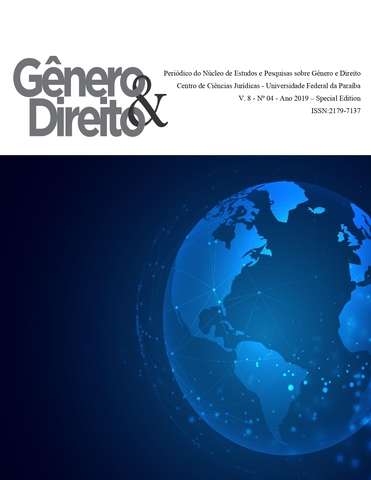GEOGRAPHY, MULTICULTURALISM, CITY: MODERN ASPECTS
DOI:
https://doi.org/10.22478/ufpb.2179-7137.2019v8n4.48391Palavras-chave:
urban areas, multicultural education, multiculturally orientated personality, geographic culture, globalization, sustainable developmentResumo
Education is an inseparable part of current global processes which is shaping and at the same reflecting the basic changes in economic, social and ecological spheres. One of the most significant current global trends is the high level of mobility of people - from tourism to growing working migration. Relocation of people, mixture of ethnic groups and nationalities have taken place in all epochs of the history of humanity but it has never been so grand-scale, that is including absolutely all continents. The development of transport, information technologies have simplified people’s relocation, including with educational purposes. Such state of things has identified multiculturalism as a separate branch of pedagogical theory and practice. Russia is a multicultural state that has formed a corresponding system of education as the foundation of national culture, outlook, based on variety of cultures, languages, traditions. Modern challenges of social development formulate a sophisticated task of up-bringing in the spirit of deep respect to all nations, the ability to communicate and cooperate with people of various nationalities, social groups, religions. Among the multitude of tasks of multicultural education, connected with designing of its contents, the most important from our point of view is the up-bringing of a multiculturally orientated personality. Multiculturally orientated personality possesses civic self-actualization, means of creative self-organization and self- realization in the multicultural world. It must possess key general competences, including the knowledge of basics and objective laws of the development of multicultural world, the ability to orientate in the cultural multi-variety of the world. The major role in solution of the task is given to studying geography, shaping geographic culture. Geoculturalistic agenda, various aspects of studying geography has very deep roots. Geography is tensely connected with the idea of culture. Culture is territorial, that is it experiences full-scaled influence of geographic factor, it is differentiated in space, and is organized in a very special way, developing and functioning in specific, immanent territorial forms. Besides, teaching geography at school does not correspond to the current demands to full extent. In secondary school, especially in city, geography is taught only in specialized classes which obviously diminish the opportunities of developing multiculturual environment to full scale. These and many other aspects of shaping geographic culture of students are realized on bachelor degree course and master course in institutions of higher education. Thus, the development of geographic culture, advance of geographic education should become the important part in solution the problems of multicultural education and multicultural preparation of specialists.Downloads
Referências
Zinurova R.I., Fatykhova F.F. Social health of youth from various ethnic groups: sociological conceptualization. Bulletin of Kazan Technological University.2011. No. 20.260-263.
Kubyshkina E.N., Urazmetov I.A. The relevance of environmental education in the preparation of future teachers of geography at the present stage / E.N. Kubyshkina, I.A. Urazmetov // Kazan Science, - 2016, -№4, - P. 125-127.
Novolodskaya S.L. History and modernity of multicultural education: monograph / S.L. Novolodskaya. - Chita: ZIP Copper, 2015. - 122 p.
Safonova M.V., Khusnutdinova SR The role of education in urban change. In the collection: Mosaic of urban spaces: economic, social, cultural and environmental processes, a collection of materials of the All-Russian Scientific Conference. Lomonosov Moscow State University; Russian Geographical Society. 2016. Pp. 51-55.
Khusnutdinova S.R. Modern city, the main development trends. Ecological consulting. 2011. № 4. Pp. 18-24.
FK Zavgarova, Battalova A.D., the A.F Mukhammatgalieva Repetition in the structure of tatar fairytale's texts (the device of stringing in chain-Structures of the type) / Life Science Journal.2014. V. 11. № 11.Pp. 602-605.
H. Hoernig, M. Walton-Roberts. Multicultural City / International Encyclopedia of Human Geography.2009, Pages 201-210
C. Gibson, G. Waitt.Cultural Geography / International Encyclopedia of Human Geography.2009, Pages 411-424
Tariq Modood. Integration and Multiculturalism: Focus on Western Europe / International Encyclopedia of the Social & Behavioral Sciences (Second Edition). 2015, Pages 235-242
Rozita Ibrahim, Nazri Muslim, Ahmad Hidayat Buang. Multiculturalism and higher education in Malaysia. Procedia Social and Behavioral Sciences 15 (2011) 1003-1009
Vlado Petrovski, Snezana Mirasciev, Emilija Petrova-Gjorgjev.Multiculturalism, globalization and the implications on education / Procedures - Social and Behavioral Sciences, Volume 15, 2011, Pages 1366-1371
Http://tatstat.gks.ru/
Http://www.stupeni15.edusite.ru/dswmedia/_file_doc_fgos_oo.pdf

